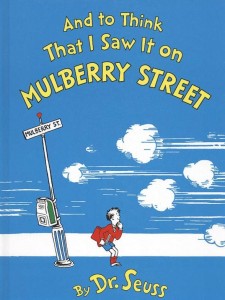I like Dr. Suess – NOT ONLY because I have small children who love to have books read to them early in the morning and before getting all tucked in, AND NOT ONLY because Dr. Seuss himself was a master of playing with words, something I increasingly enjoy, BUT ALSO because the books by Dr. Seuss thrive on the imagination of something greater than the ordinary, or the expected norm. Who would have thought that the pale green pants with nobody inside them was actually walking around hoping to meet a friend!! Additionally to the creative imaginary element of the story, there`s often a life lesson that gets thrown in free of charge! Remember those Sneetches on the beaches – they eventually understood that, stars or no stars on the belly, they really were all one and the same (and suddenly all a lot poorer too!).
Perhaps you are wondering why on earth I am writing about Dr. Seuss. Can I tie together the literary genius and common sense of Dr. Seuss with a biblical call to be peace-makers in a broken world? A world that is at times fractured along lines that we would assume to be strong…maybe bendable but certainly not breakable.
I am secunded to an MCC partner organization (INESIN), that seeks to build unity and a true peace between and amongst Christian confessions in Chiapas, Mexico. Yes its sad to see tension, conflict and even violence occur due to misconceptions and deep-seated historical division in perspectives on faith and life. But my focus here is not about the unfortunate norm (which we see in every part of the world). I am asking us collectively to think as a child, with Dr. Seuss in hand.

Logo and theme for the Week of Prayer for Christian Unity, celebrated in Chiapas during the month of May
Recently INESIN celebrated its 15th Anniversary as a civil society organization, and with that came 3 days of celebration, reflection, and motivation to continue the inter-confessional work that has been realized to date (for a summary of that event, see our blog post from mid-May). During those three days I more intently began to ask the question…”are WE (as a whole body of Christ), missing something in God`s kingdom by not venturing outside of our denominational walls (NOT ONLY as individuals, but EQUALLY important as Christian communities)? What could we accomplish, even by focusing a portion of our energies (and/or resources) on building a common, unified (and I suggest, tangible) testimony to Christ`s call to justice and peace. Undoubtedley I need to clarify that I am not against the concept of a denomination (i.e. confession), which provides its followers a unique perspective on following the way of Christ. BUT, I will attest that when folks from various confessions come together under a common goal or project, new relationships are born, misconceptions are up-rooted, and the creative imagination of those involved forms richly diverse images (realities) of a new kingdom quite different from our current one……mmmm this reminds me of what Marco saw on Mulberry Street on his way home from school (Dr. Seuss, And to Think That I saw it on Mulberry Street).
I have no proper end to this post, other than to say that I am in the midst of pondering this concept, and thanks to MCC and INESIN, have opportunities to be involved in inter-confessional partnership. I can “see in my head”, though just a portion, the imagination of family, friends and colleagues who have laid exemplary and tangible pieces for this type of work, and those who have the potential to offer their gifts and abilities to construct much more. I “see” communities (this includes churches, towns, organizations, etc) in areas where I have lived…..here in Chiapas, in Saskatchewan, and British Columbia – logical and sometimes illogical partnerships that are melded through the creative force of the Spirit. I also see God`s handiwork, his lasting image, when I see the wonder, creativity and imagination of children…..yes at times engaged in a good round of reading Dr. Seuss.


One Response to Should we? Could we? Can we?